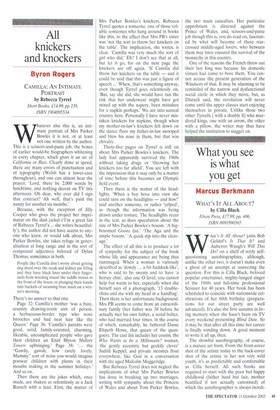knickers and knockers
Byron Rogers
CAMILLA: AN INTIMATE PORTRAIT by Rebecca Tyrrel Short Books, £14.99, pp 239, ISBN 1904095534 Whatever else this is, an intimate portrait of Mrs Parker Bowles it is not, or at least not one written by the author. This is a scissors-and-paste job, the bones of earlier would-be biographers whitening in every chapter, which gives it an air of California or Bust. Clearly done at speed, there are many errors of punctuation and of typography (Welsh has a lower-case throughout), and one can almost hear the prayer, 'Lord, there be 2,000 words by lunchtime, and nothing decent on TV this afternoon. Oh dear, why ever did I sign that contract? Ah well, that's paid the nanny for another six months.'
Because, with the exception of Jilly Cooper who gives the project her imprimatur on the dust jacket ('I'm a great fan of Rebecca Tyrrel's ... she writes beautifully), the author did not have access to anyone who knew, or would talk about, Mrs Parker Bowles, she takes refuge in generalisation at long range and in the sort of compound adjectives beloved of Dylan Thomas. sometimes in both.
People like Camilla don't worry about getting dog drool over the steak and kidney pie filling and they have black lines under their fingernails from weeding round the taddle stones in the front of the house or plunging their hands into buckets of steaming bran mash on a winter's morning.
There's no answer to that one.
Page 32: Camilla's mother 'was a busy, country drawing-room sort of person, a herbaceous-border type who wore brooches and had neat hair like the Queen.' Page 36; 'Camilla's parents were good, solid, family-oriented, charming, likeable, uncomplicated people who gave their children an Enid Blyton Mallory Towers upbringing.' Page 38: `... the "Gawily, gawsh, how rarely lovely, Mummy" sort of noise you would imagine postwar children with plums in their mouths making in the summer holidays.' And so on.
Then there are the jokes which, once made, are shaken as relentlessly as a Jack Russell with a lead. First, the matter of
Mrs Parker Bowles's knickers. Rebecca Tyrrel quotes a someone, one of those voluble someones who hang around in books like this, to the effect that Mrs PB's sister was 'not the sort to throw her knickers on the table'. The implication, she writes, is clear. 'Camilla was very much the sort of girl who did.' Eh? I don't see that at all, but let it go, for on the next page the knickers are off again. 'If Camilla did throw her knickers on the table — and it could be said that this was just a figure of speech ...' Whew, that's something anyway, even though Tyrrel goes relentlessly on, 'But, say she did, she would have run the risk that her underwear might have got mixed up with the napery, been mistaken for a napkin perhaps.' We are into surreal country here. Personally I have never mistaken knickers for napkins, though when my mother-in-law's knickers fell down on the dance floor my father-in-law swooped and blew his nose in them, but that was chivalry.
Thirty-five pages on Tyrrel is still on about Mrs Parker Bowles's knickers. The lady had apparently survived the 1960s without taking drugs or `throwing her knickers too far afield'. You are left with the impression that it may only be a matter of time before this becomes an Olympic field event.
Then there is the matter of the headlights. When a boy hove into view she could turn on the headlights — and how!' said another someone, or rather 'yelped', as though the information was being drawn under torture. The headlights recur in the text, as does speculation about the size of Mrs Parker Bowles's bosom. 'A bigbosomed Goons fan.' The Aga and the ample bosom.' A quick dip into the cleavage.'
The effect of all this is to produce a lot of sympathy for the subject of the book whose life and appearance are being thus rummaged. When a woman is variously described as 'dowdy ... a bit haddock-like', who is said to be sweaty and to have `a horsey chin', also one 0 level, you cannot help but warm to her, especially when she herself says of a photograph, '13 doublechins and me with my head in a handbag'. Then there is her unfortunate background. Mrs PB seems to come from an extraordinary family (her father was 38 before he actually met his own father, a serial bolter, who had married four times, in the course of which, remarkably, he fathered Dame Elspeth Howe, that queen of the quangoes). The cast list includes her cousin, the Who Wants to be a Millionaire? woman, 'the gently eccentric but geekily clever' Judith Keppel, and private incomes float everywhere, like God in a conversation with the aged Malcolm Muggeridge.
But Rebecca Tyrrel does not neglect the implications of what Mrs Parker Bowles has done in breaking up two marriages, writing with sympathy about the Princess of Wales and about Tom Parker Bowles,
the two main casualties. Her particular opprobrium is directed against the Prince of Wales, and, scissors-and-paste job though this is, you do read on, fascinated by what will become of these starcrossed middle-aged lovers, who between them may have ensured the survival of the monarchy in this country.
One of the reasons the French threw out their last king was because his domestic virtues had come to bore them. You cannot accuse the present generation of the Windsors of that. It may be alarming to be reminded of the narrow and dysfunctional social circle in which they move, but, as Disraeli said, the revolution will never come until the upper classes start enjoying themselves in private. Unlike those two other Tyrrells ( with a double 11) who murdered kings, one with an arrow, the other with a pillow, the writer may thus have helped the institution to stagger on.


















































































 Previous page
Previous page